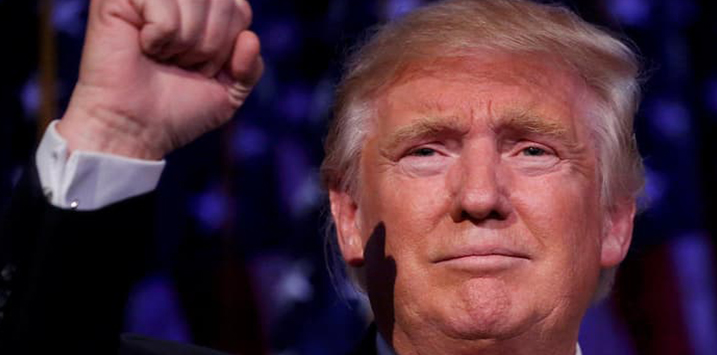
What does a Trump–Republican win mean for investors?
With election uncertainty finally out of the way, investors now need to grapple with a new question: how does this change in the US political landscape affect markets and market expectations? Is it time to be greedy, or fearful?
Assuming the two undecided states, Michigan and New Hampshire, fall to the current leading candidate, then President Elect Donald Trump will secure 306 Electoral College votes to Hillary Clinton’s 232. Which means the Republican Party will win majorities in both the US Senate and the US House.
The biggest fear is the potential threat to global trade, where, for example, Trump canvassed the renegotiation of NAFTA (The North Atlantic Free Trade Agreement) and rejection of the TPP (the Transpacific Partnership Agreement). This latter agreement, seven years in the making, covering 12 TPP nations and 40 per cent of the global economy, was expected to deliver valuable new markets for Australia’s beef, wheat and dairy industries.
Trump’s “tough on China” stance will cause markets the most consternation if the proposals of 45 per cent tariffs and reacting to China being a “currency manipulator” ever come to fruition.
Repeal of the Affordable Care Act (Obamacare) will likely be negative for selected US healthcare and related companies as the government’s expansion of the Medicaid program for the poor is put on hold.
The potential for fiscal stimulus, lower corporate taxes and tax holidays for the repatriation of offshore funds may be positive for the US Dollar, but it is also likely to be negative for bond yields. In recent months, the yield for US ten-year treasuries has jumped by 0.7 per cent from an all-time low of 1.36 per cent to 2.06 per cent. (Australian ten-year government bond yields have followed suit, rising from 1.8 per cent to 2.5 per cent).
Finally, any jump in US inflationary expectations could see the US Federal Reserve pushing the cash rate up quite quickly over 2017. The Federal Open Market Committee next meets in mid-December and an increase from 0.25 per cent to 0.5 per cent seems likely.
It is very difficult to know how this plays out for share markets around the world. While volatility is likely to be greater, the team at Montgomery will continue to focus on high quality businesses with good prospects at reasonable prices.
Hi David, this is Howard Marks’ latest memo. In it, he reprints Druckenmiller’s latest views at length and comments on it:
https://www.oaktreecapital.com/insights/howard-marks-memos
Kelvin
Hi David, thanks.
Marks vs Druckenmiller & Grantham. Who will be right? Who know? One thing is for sure, one of them will be wrong. What to do? I can think of nothing better than what you guys as value investors do, buying good businesses at good prices and holding a reasonable amount of cash.
Also, Donald Trump seems to be a more rational human being after he’s won. See this 60 minutes interview:
http://www.cbsnews.com/news/60-minutes-donald-trump-family-melania-ivanka-lesley-stahl/
Talk about campaigning in poetry and governing in prose!
Kelvin
Also David, US financials as the yield curve steepens?
Kelvin
Thank you Kelvin, yes with US ten-year Treasuries up by 0.8% from 1.36 per cent to 2.16 per cent in recent months, this will assist banks’ net interest margins. Add a “pro-business” President-elect, who wants to cut both taxes and regulation, and financials reacted very positively.
I am still cautious on the undercapitalised European Banks, and wonder whether this Sector will cause some liquidity scares if the political will in that region (Italian referendum in December and French election in April 2017) heads down the “Brexit path”. http://rogermontgomery.com/is-deutsche-bank-about-to-bring-on-a-fresh-financial-crisis/
Thanks a lot David.
Hi David, thanks.
In contrast to what he said at the Sohn Conference in May, Druckenmiller has turned hopeful:
http://finance.yahoo.com/news/billionaire-druckenmiller-says-hes-quite-125958744.html
Kelvin
Thank you Kelvin. A number of the Montgomery team went to the Sohn Conference last Friday and Oaktree Capital’s Howard Marks claims that while we are in the seventh or eighth innings ( a baseball game consists of nine innings) in terms of “optimism” he had no idea what a Trump victory meant. He did say a lot of legislation required 60 per cent of the votes in The Senate (the Republicans gained 51/100 votes).
Hi David, thanks.
May be Howard Marks was referring to optimism in the junk bond market/ distressed debt market, which he focuses on? Its hard to see widespread optimism for the equities market. Most commentators are bearish, as Jeremy Grantham pointed out in his recent quarterly letter:
https://www.gmo.com/docs/default-source/public-commentary/gmo-quarterly-letter.pdf?sfvrsn=38
He sees not a 2 year bust, but a 20 year whimper.
In any case, one can get a garden variety correction of 10-20% any time. But to get a severe bear market of more than 20% akin to the GFC, you really need a US recession and that’s nowhere insight, given 1.) US manufacturing PMI is over 50; and 2.) the yield curve is positive and steepening.
Kelvin
Howard was referring to “optimism” in terms of valuations and the absence of distress or “panicky sellers”.